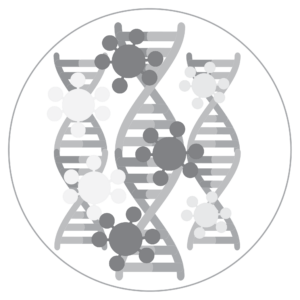
The program in Cancer Biology spans many disciplines, including cell biology, genetics, biochemistry, microbiology, pharmacology, pathology, epidemiology, bioinformatics, and immunology, to name a few. It represents a unique set of training and educational activities that, taken collectively, expose the student to the full breadth of cancer biology while allowing immersion in a specific dissertation topic of the student’s choice. A common theme that unites these diverse endeavors is the desire to push the limits of our understanding of these processes to the highest possible molecular resolution. The program is designed to provide graduate and medical students with the education and training they need to make significant contributions to the field of cancer biology, both in the laboratory and the clinic.
The program conducts research in diverse areas:
- Apoptosis and autophagy
- Tumor cell biology
- Chromosome stability and genome maintenance
- Cell motility and metastasis
- DNA repair, replication and recombination
- Transcriptional and translational regulation
- Metabolism
- Imaging technologies
- Receptor-ligand interactions
- Signal transduction molecules and pathway
- Biomarker studies
- Genomic mutation profiles and informatics
- Non-coding RNAs
- Tumor immunology and vaccines
- Tumor viruses
- Hematopoiesis
- Cancer disparities
- Small molecule and nanotechnology discovery
- Tumor microenvironment
- Clinical trial research
Students in the Cancer Biology (CB) program will typically take four (4) to five (5) courses during Year 1. Students will also participate in three laboratory rotations over the fall and spring semesters of Year 1 prior to selecting a thesis lab. Students are expected to complete the following coursework during their entire graduate education:
DBBS required courses
Graduate Research Fundamentals
Ethics and Research Science – typically taken in Year 2
Program required courses
Foundations in Cancer Biology
Experimental Cancer Biology
Elective in advanced cancer biology
Qualifying exam
In the spring/summer semesters of Year 2, students must pass a Qualifying Exam (QE). Following a successful QE defense, students will identify and finalize their committee and complete their thesis proposal by December 31 of Year 3.
Thesis committee, proposal, and defense
In the summer and/or fall semesters of Year 2 after rotations are completed, students will select a thesis advisor and begin working in their thesis labs. Students will then select a thesis committee and complete their thesis proposal. Students will complete their thesis research, defense, and graduation over the rest of their graduate career. Most students graduate within five (5) to six (6) years of beginning their program.
Faculty Co-Directors:
Graduate Program Administrator: